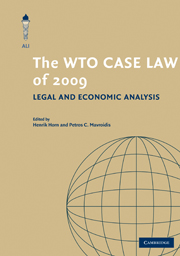Book contents
- Frontmatter
- Contents
- Foreword
- Introduction
- US Compliance with WTO Rulings on Zeroing in Anti-Dumping
- United States – Continued Existence and Application of Zeroing Methodology: the end of Zeroing?
- Incomplete Harmonization Contracts in International Economic Law: Report of the Panel, China – Measures Affecting the Protection and Enforcement of Intellectual Property Rights, WT/DS362/R, adopted 20 March 2009
- Comment
- Trading Cultures: Appellate Body Report on China–Audiovisuals
- Comment
- ‘Optimal’ Retaliation in the WTO – a commentary on the Upland Cotton Arbitration
‘Optimal’ Retaliation in the WTO – a commentary on the Upland Cotton Arbitration
Published online by Cambridge University Press: 05 December 2011
- Frontmatter
- Contents
- Foreword
- Introduction
- US Compliance with WTO Rulings on Zeroing in Anti-Dumping
- United States – Continued Existence and Application of Zeroing Methodology: the end of Zeroing?
- Incomplete Harmonization Contracts in International Economic Law: Report of the Panel, China – Measures Affecting the Protection and Enforcement of Intellectual Property Rights, WT/DS362/R, adopted 20 March 2009
- Comment
- Trading Cultures: Appellate Body Report on China–Audiovisuals
- Comment
- ‘Optimal’ Retaliation in the WTO – a commentary on the Upland Cotton Arbitration
Summary
Abstract: The Upland Cotton case raises a range of interesting issues regarding the rationale for retaliation in the WTO system and the proper approach to its calibration. These include: Should the approach to retaliation differ in cases involving prohibited or actionable subsidies? When should cross-retaliation be allowed? Should retaliation be based only on the harm to the complaining nation, or to other nations as well? And, most importantly, what economic content can be given to the standard of countermeasures ‘equivalent to the level of nullification or impairment’? We address these and other issues from both a legal and economic perspective, with particular attention to the question of what level of retaliation will restore the lost welfare of the complaining nation.
The United States is a leading producer and exporter of cotton. Its market share in world cotton trade has averaged 37% since the year 2000, and some 70% of US production on average has been exported. The US cotton industry has also long been the beneficiary of various forms of government support, averaging some $3.55 billion per year since 2000, as compared with average annual cotton output in the United States of $4.26 billion. These statistics alone suggest that US government programs for cotton production have had a sizeable impact on the competitive position of US cotton growers.
In 2002, Brazil requested consultations with the United States regarding various US government programs benefiting producers of upland cotton.
- Type
- Chapter
- Information
- The WTO Case Law of 2009Legal and Economic Analysis, pp. 133 - 164Publisher: Cambridge University PressPrint publication year: 2011

